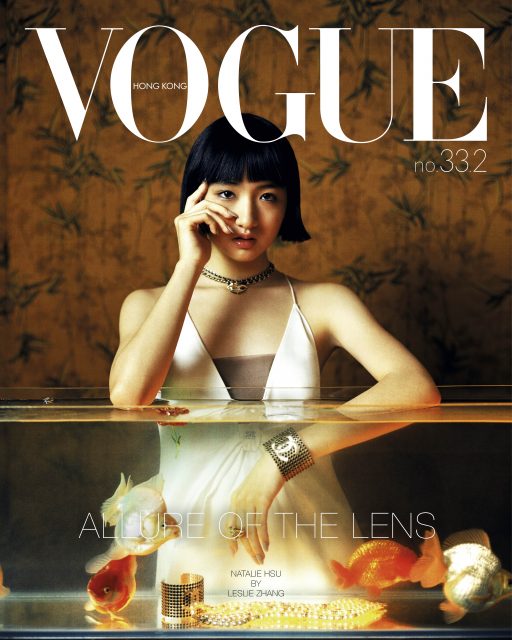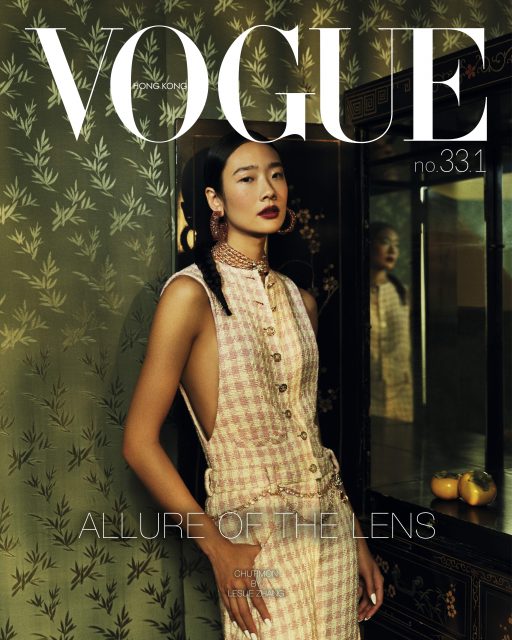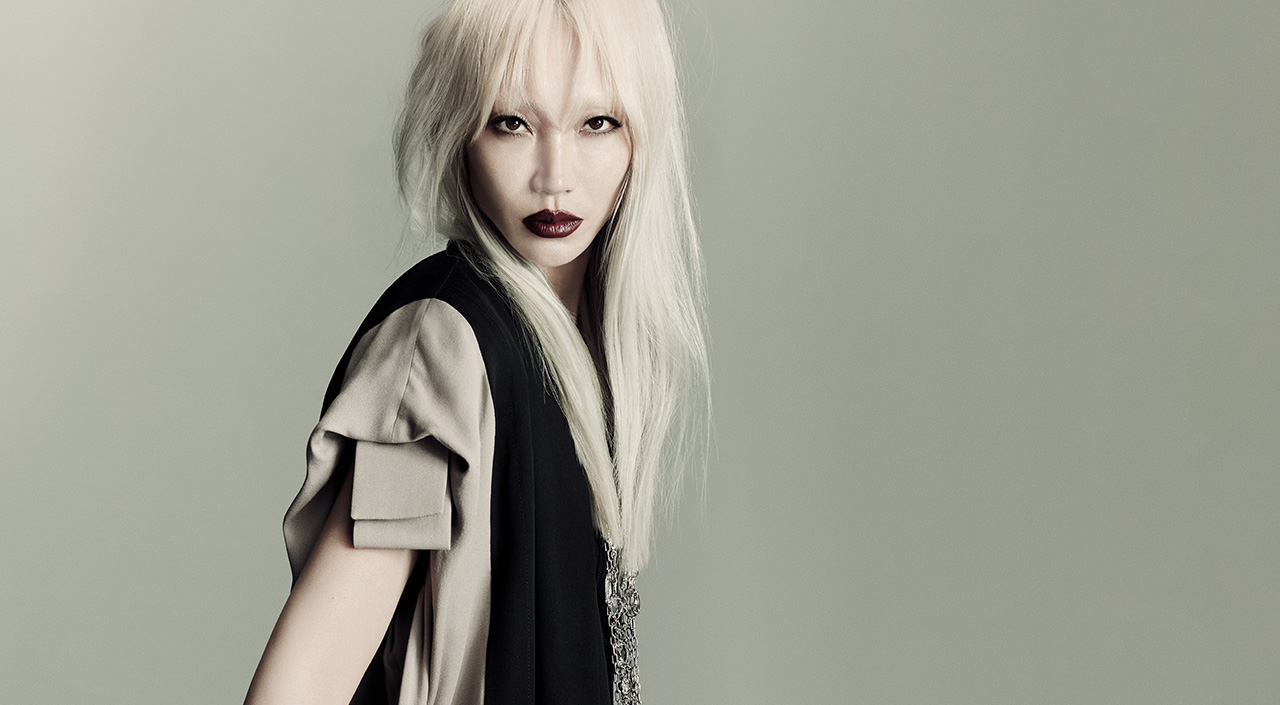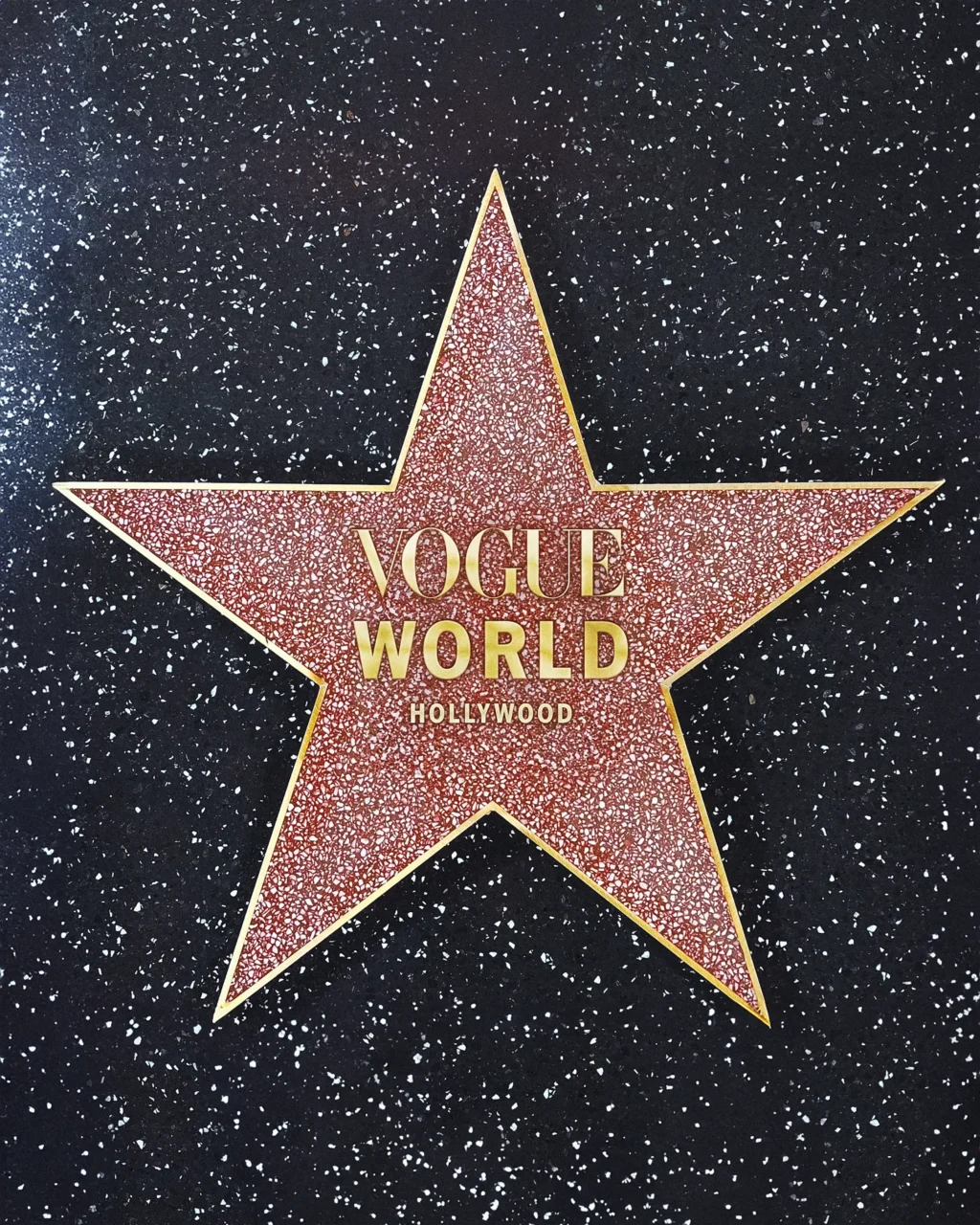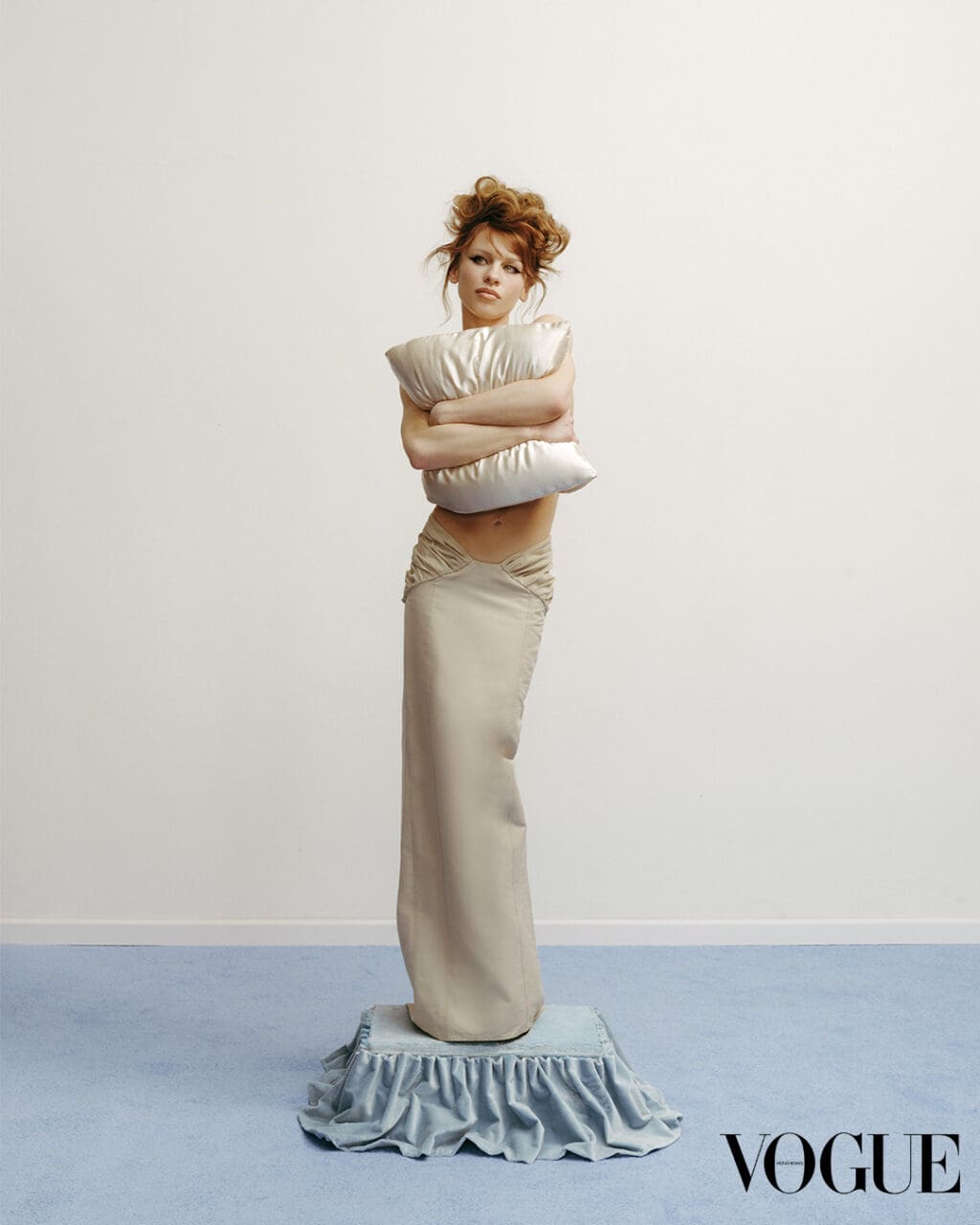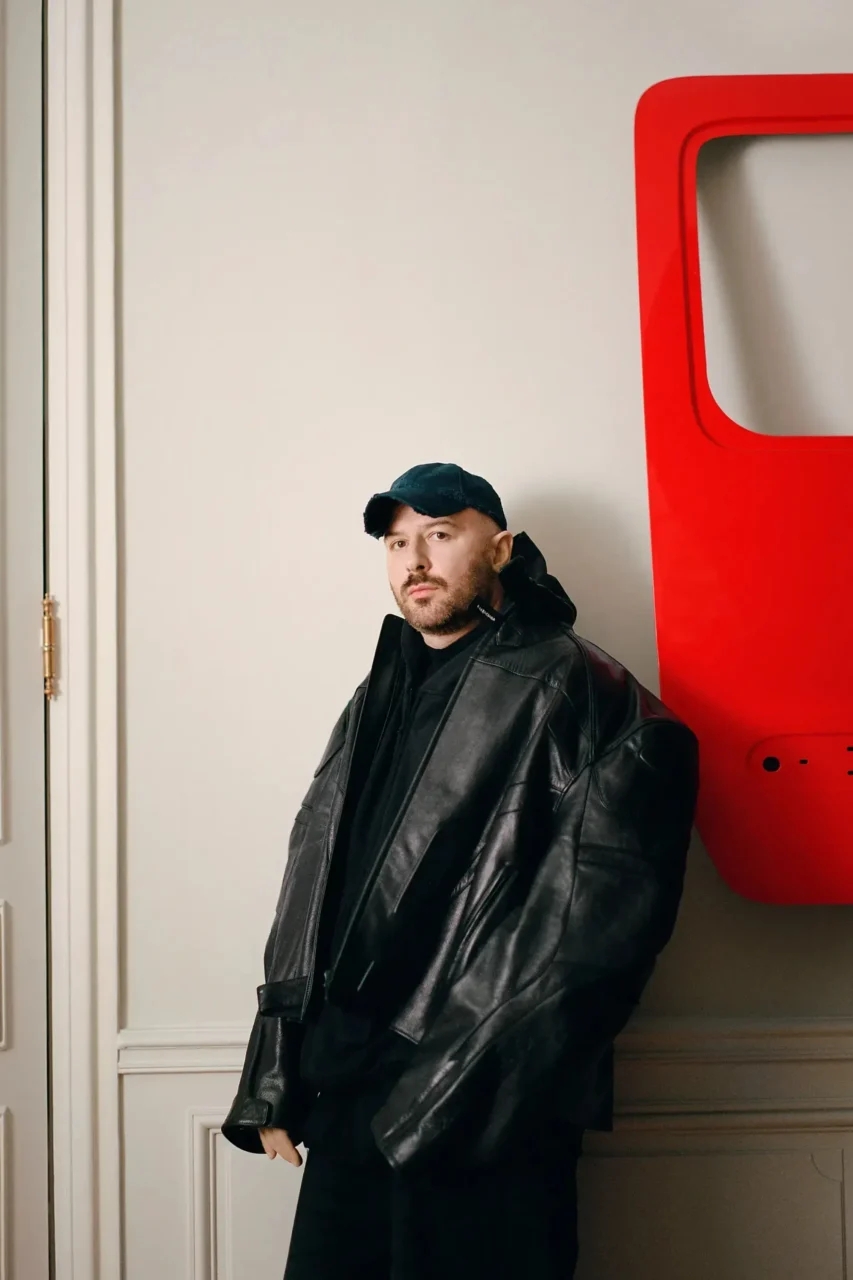Daring, expressive, and passionate are only a few ways to describe Amy Lo. In the battlefield that is the film industry, the actress’ emotional sensitivity and her courage to challenge the norm are her greatest weapons. Over the past few years, she has proved herself through popular Hong Kong TV series such as Generation Slash and Afterlife Firm and is set to make her female lead debut on the silver screen with the upcoming film An Abandoned Team. When asked why she loved acting, she responded: “Because you have every right to be crazy, no one is going to judge you!” In a city bound by rigid societal standards, being crazy can sometimes just mean being yourself — a risk most aren’t willing to take. But Lo musters up the courage to embrace every side of her: the good, the bad and the crazy.
You shot with Leslie Zhang for the first time for your Vogue Hong Kong digital cover — how was it?
We had a chance to work together before, but it didn’t happen because of the pandemic. Now, our stars have aligned! Leslie was quite different than I thought he would be. He is an extremely experienced photographer, but he is very humble. As soon as we met, he put his hands together and said, “hello, hello” to me. He is funny, endearing, and soft-spoken. He was gentle and guided me throughout the photo shoot, it went really smoothly.
I rarely do photo shoots in swimsuits, and it was the first time I shot in a set that resembled those used in films. Although it was a relatively short shoot, it went really well. I was very happy that I got to work together with Leslie. I snuck a peek at the photos during the shoot, and I’m looking forward to seeing my digital cover!
You attended Paris Fashion Week with Chanel. What was the most memorable moment?
The whole fashion week was unforgettable! It marked a lot of firsts for me: my first trip to Paris, my first trip abroad with my company and management team, my first Chanel fashion show, my first time meeting with the Chanel team in France…It was a very memorable fashion week, but the most unforgettable part was visiting Coco Chanel’s apartment. There was a lot to see in the flat, and there was a different story behind each floor. There was a floor for haute couture, one for storing treasured collections and the most special part was a room where Coco Chanel entertained her friends and guests. I left thinking, “Oh, so this is how a Chanel collection was born!” From the details of her apartment, I could tell that Coco Chanel was a tasteful woman with great ideas.
How does Chanel inspire you personally?
After my trip to Paris with Chanel, I gained a deeper understanding of what “be yourself” meant. I felt Coco Chanel’s spirit, and I was very inspired by her story — if she hadn’t been herself, been so bold, and worked to change womenswear, she wouldn’t have become Coco Chanel, and we would not know her brand today.
When I was young, I only knew that Chanel was a luxury brand. After growing up and becoming a model, I wanted to work and walk for Chanel and soon realised that Chanel is not just a fashion brand. I’ve worked with Chanel on different occasions. What’s interesting is that Chanel has been with me through different stages of my career, from shooting a magazine spread and attending events to shooting magazine covers and films and going to Paris with the brand. I shared many special moments in my life with Chanel. When I look back at my previous photos or magazine covers from three or four years ago, I realise that the person working with Chanel then is different from the person I am now.
How do you think Chanel resonates with the younger generation like you?
Simply put, Chanel encourages us to be ourselves, explore what we want to do and leave our own iconic legacy. Everybody wants to be somebody now, and it’s normal because we have more ways to learn about iconic figures around the world and discover things we want to try out. A lot of people, myself included, are not particularly bold or very inclined to show our true selves to the world, so we tend to imitate other people and lose our own shine or forget about our identity while fitting into societal standards. The key to Chanel’s success and timeless allure lies in the brand’s prominent design language. Of course, this language evolves with the times, but one as distinctive as Chanel’s is hard to come by.
What is your must-have item from Chanel, and why?
One item? Are you kidding me? I think each person is multifaceted, and what’s so special about Chanel is that I can express every side of myself through the brand. There is no limit to what you can do with Chanel clothing, and there is no set way of wearing them either. When I was in Paris, I bought a pair of printed Chanel jeans that were hard to find. I have a lot of different Chanel pieces, but not a lot that I can wear on a daily basis. I’ve been wearing these jeans for a lot of special occasions lately. They fit perfectly – not too tight or loose – and they’re fun. Chanel handbags are also a must-have. It’s difficult to choose one, but if I had to, I’d pick the Chanel 22.
When did you realise you wanted to be an actress?
I wanted to be an actress because I wanted to have fun. I shot a commercial once and found the process very enjoyable. Of course, I’ve always loved watching films, and I’m actually in a film club with my friends, where I share my thoughts on different films There are a lot of similarities between films and commercials: there’s dialogue, interactive scenes and film direction. Filming a commercial was what exposed me to acting. I think acting is fun because you have the right to be someone you are not. If you pretend to be someone else on the street, people will think you are crazy. But acting means going crazy. A French director I met in Japan once asked me: “Why do you enjoy acting?” I responded: “Because you have every right to be crazy, no one is going to judge you!” The director told me later that my answer left a deep impression on him as it was very real.
How has your mixed cultural background influenced your ways of self-expression or your identity as an actress?
I am expressive. I grew up under the influence of two different cultures, and I would say that I was especially influenced by my mother. I’ve noticed that local Hong Kongers like my father and some of my cousins tend to keep to themselves. The extent to which you are in touch with your own emotions determines whether you will become a person who is good at articulating your feelings. For example, when you are happy, you can only express your happiness when you are able to identify it. I grew up between two cultural extremes, so I am more sensitive to my own emotions.
Your latest TV series Generation Slash is about slashers. As a multi-hyphenate yourself, what are your thoughts on the rising young slasher generation today?
I think “slashing” describes the state of our society today. Very few people only do one thing, even my friends have all become “slashers”. Like everything else, slashing has its pros and cons. The increasing amount of people working multiple jobs is a reflection of how diverse our world is becoming. Everyone wants to achieve more, as there are more avenues to pursue different dreams and explore your identity. However, I think slashing should be a means and not an end. During the process, we can get to know ourselves better and discover what speaks to us the most, but it is also inevitable that we feel lost at times, and it is easy to forget our original intentions and stray from our goals. I discovered my passion for film while I was pursuing modelling, and I might even work behind the scenes for a movie in the future, who knows? Slashing opens up endless possibilities, so I recommend it, but it should never be your final destination.
Out of all the roles you played, which one was the most memorable? Which role do you relate to the most and why?
My most memorable role would have to be my role in An Abandoned Team because it is my first lead role on the silver screen. Whenever I welcome a character into my life, I get to know myself better and discover a side to me that has not been discovered.
In An Abandoned Team, I play a girl called Una. We both love animals, and in situations where we must be brave to help people, we can both muster up the courage to do so. I’m a Libra, so maybe that’s why I fight against injustice. About three years ago in Causeway Bay, I saw someone trying to run over a stray dog with a hand trolley because it was walking past an area where a lot of lorries were going in and out. I don’t know how I mustered up the courage to do so, but I walked up to confront the person. Una is bold in a different way, though, she is always brave. She can also be quite aggressive sometimes, while I rarely talk back in fights.
You are working with industry veteran Lawrence Cheng to film An Abandoned Team. Are there any behind-the-scenes stories you can share with us?
Lawrence is tall and skinny like my father, so I think of my father when I look at him. We didn’t know each other very well, so I would worry while I acted, and sometimes my performance would be unstable. However, he would make an effort to become closer to me by bringing a chocolate croissant and black coffee (sometimes he makes his own) every time we were on set, but he wouldn’t say much when he handed me the food. He didn’t just teach me more about acting, but he also slowly brought my walls down. He wasn’t just an acting coach to me, he was a life coach. In the end, we bonded and would even engage in playful banter. It was very special, and I’ve never been able to do this with a senior.
What’s next for you? Which type(s) of characters or movies would you like to play in the future and why?
I want to try everything. I hope that Hong Kong cinema will embrace bolder films, not just ones about romance or urban life. There are all kinds of people in our industry, so I hope that Hong Kong films can have more experimental themes and daring roles so that we can have more fun. I really want to be a part of these kinds of films, especially after watching Everything Everywhere All At Once.
Who are your role models in the industry? How did they influence your acting journey?
All my role models have one thing in common: they don’t fit into the public standard of “beauty”, but they each have their own edge, women like Tilda Swinton, Kristen Stewart, Zendaya and Cate Blanchet, just to name a few. They are full of character and fearlessly stay true to themselves. I admire them a lot, and I really want to learn from them. I don’t think there are many actors like them in Hong Kong because people are very stuck on their definitions of what it means to be “beautiful” and “good-looking”, what it means to “have potential” and “be suitable for a film”. Those who are not afraid to be themselves have found it hard to make it in our industry, so I hope everyone can be bolder, myself included.
Photography: Leslie Zhang
Fashion Direction & Executive Producer: Sean Kunjambu
Editorial Consultant: Adam Chen
Producer: Katherine Ho
Makeup Artist: Yooyo Keong Ming
Hair Stylist: Nate Peng
Manicurist: Pinky Ho
Set Designer: Ip Siu
Assistant Set Designer: Joan Leung
Production Assistant: Echo Yuan
Photography Assistants: Wu You & Liao Zining
Hair Stylist Assistant: Fan Tongjun
Fashion Assistant: Pianca Ngan
Retouching: Li Huiwan
Art Team: Kumi Tong, Caster So, Cat Wong, Naomi, Jonas Fong & Judy Poon
Cover Wardrobe: Chanel
Editor
Kaitlyn Lai and Cathy Huang

